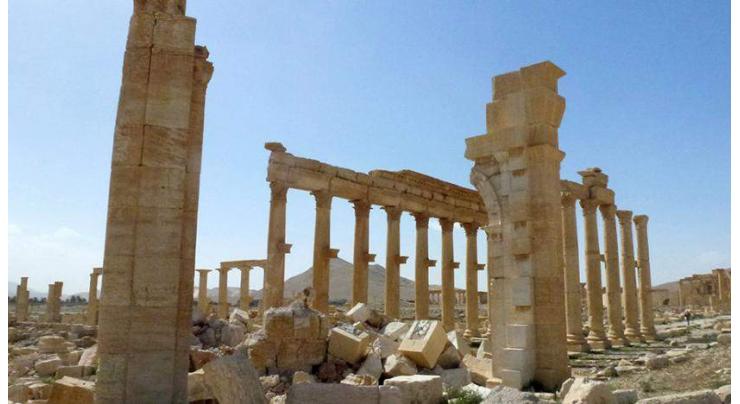
- Home
- World
- News
- Lebanon Serves as Main Gateway for Terrorists to Smuggle Artifacts From Syria - Researcher
Lebanon Serves As Main Gateway For Terrorists To Smuggle Artifacts From Syria - Researcher
Faizan Hashmi Published November 28, 2019 | 02:00 PM

Terrorists use Lebanon as the main exit point for trafficking in looted Syrian antiquities, while the buyers are spread all over the world, Amr al-Azm, co-director of the Antiquities Trafficking and Heritage Anthropology Research (ATHAR) Project, told Sputnik in an interview
GENOA (UrduPoint News / Sputnik - 28th November, 2019) Terrorists use Lebanon as the main exit point for trafficking in looted Syrian antiquities, while the buyers are spread all over the world, Amr al-Azm, co-director of the Antiquities Trafficking and Heritage Anthropology Research (ATHAR) Project, told Sputnik in an interview.
ATHAR studies digital market in looted antiquities from the middle East and North Asia, in particular, the activities of Facebook groups used for trading stolen artworks. Al-Azm co-authored the ATHAR Project's report, which was published in June after two years of research.
Some of the artifacts plundered in Syria go to Turkey through passing points controlled by the Hayat Tahrir al-Sham, formerly known as the Nusra Front terrorist group (banned in Russia), according to al-Azm. However, he said that Lebanon was now "the main exit point" for looted artifacts, followed by Turkey and Jordan "to a lesser extent."
Buyers can be found in the Gulf states, Southeast Asia, Europe and America, according to the researcher, who has studied the activity of almost 100 Arabic Facebook groups involved in the trade of looted cultural items from the Middle East.�
"Here is a real-life example. There is a Jordanian dealer who has a fixer in Istanbul. The Jordanian dealer gets a sense of what he wants on Facebook, then he tells his fixer what he is looking for. Then he books a flight, a holiday in Istanbul, he shows up in Istanbul, the fixer meets him at the airport, gives him a one-time-use phone, takes him to the hotel and then the fixer will arrange for the people with the goods to come to the hotel to meet with the guy. He sees the samples of the goods and then he decides to take an excursion trip to southern part of Turkey near the Syrian border where there are some other goods that may look interesting for him, and then he settles the bill, he leaves Istanbul, and then the smugglers do the arrangements," al-Azm said.
The situation in Lebanon is slightly different because dealers there usually have "associates in Syria and in opposition-held areas" that they can send check the item, and who then leave and open a route for said item to be smuggled into Beirut, he continued.
Smugglers use Lebanon because of the loose control over movement of cultural items and the existing arrangements between Syrian looters and Hezbollah, the researcher suggested.
"Now, on Facebook, there is a guy who is selling a looted item from Afrin with a beautiful mosaic. I have been told that they are now sitting north of Beirut waiting to be shipped out. The thing was looted by a Nusra affiliate. Then they had arrangements with Hezbollah people, they smuggled it to Lebanon, and they get smuggled out," al-Azm said.
He further remarked that corrupt officials close to the Syrian government may also be involved in these illegal schemes.
"You can't see it in terms of the regime being involved officially in the traffic of looted antiquities, but endemic corruption and non-state actors, as well as para-military formations fighting alongside the regime supplement their income by participating in illegal trafficking, dealing, smuggling of contraband, including looted antiquities," al-Azm said.
Asked if any existing established auction houses were involved in this trade, al-Azm said he had no knowledge on this matter.
Related Topics
Recent Stories

Cricket: England v West Indies 3rd Test scoreboard

Finance minister briefs Chinese officials on reform agenda, engagement with IMF

Finland says Russian vessel violated its territorial waters

Olympic opening ceremony under way on River Seine

West Indies' treble strike rocks England in third Test

Ukraine court orders detention of suspect in murder of nationalist ex-MP

Long queues, ticketing problems ahead of Paris opening ceremony

Rana Sanaullah Khan joins Paris 2024 Olympics inauguration reception

Glowing tributes mark 69th birthday of President Zardari at Governor's House

Players unaware of spying scandal as Canada Olympic coach sent home: official

Naqvi hails Pak women cricketers for going down fighting against SL

'Sabotage' on French rail network before Olympics: What we know
More Stories From World
-
Biden talks Gaza ceasefire efforts with king of Jordan
4 hours ago -
Sinaloa Cartel co-founder pleads not guilty after stunning US capture
4 hours ago -
Panama says Venezuela blocked ex-presidents going to observe polls
4 hours ago -
Ethiopia mourns victims of landslide tragedy
4 hours ago -
Khan Yunis fighting displaces 180,000 Gazans in four days: UN
4 hours ago -
Trump slams rivals as he meets Netanyahu in Florida
5 hours ago
-
Obama & his wife, Michelle, officially endorse US VP Kamala Harris for president
5 hours ago -
Rain, cooling slow huge blaze in Canada's Jasper park
5 hours ago -
Airbus and Boeing supremacy secure despite turbulence
5 hours ago -
S.African police detain 95 Libyans at suspected military camp
5 hours ago -
'Slapping therapist' guilty over UK diabetic woman's death
6 hours ago -
Panama says Venezuela blocked flight of ex-presidents going to observe polls
6 hours ago